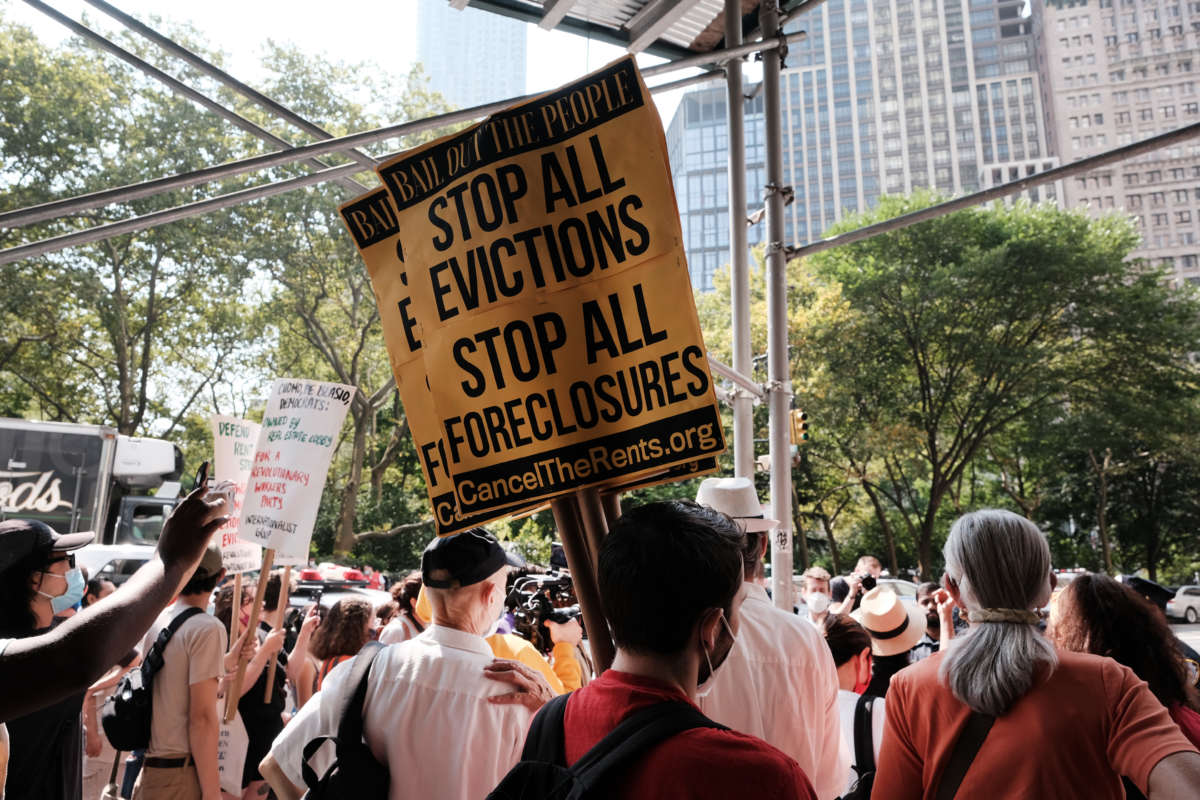Truthout is a vital news source and a living history of political struggle. If you think our work is valuable, support us with a donation of any size.
A new analysis from finance firm Goldman Sachs finds that if Congress doesn’t act soon to pass an eviction moratorium, 750,000 households could face eviction in the fall and winter.
The investment bank estimates that between 2.5 and 3.5 million people in the U.S. are significantly behind on rent, which collectively adds up to an estimated $12 billion to $17 billion.
The Goldman Sachs estimate is more conservative than a Census Bureau estimate from last week that said about 1.3 million people could be facing eviction within just the next two months. Still, both of those estimates should serve as a wake-up call for Congress, which has dragged its feet and refused to pass an eviction moratorium, even as hundreds of thousands of families are threatened with imminent homelessness and destabilization.
Part of the reason for the multibillion dollar rent debt is due to the failure of state governments to distribute tens of billions of dollars in rental aid given to them by the federal government. Lawmakers approved $46.5 billion to be disbursed to states to help residents with rent payments during the pandemic, but only about 11 percent of it has been distributed as of last week.
Of about 2.8 million households that applied for rental assistance, The New York Times reported last week, only about 500,000 have reported receiving funds, and 700,000 applications have been rejected. Many renters who are behind on rent payments, meanwhile, haven’t applied for the program. This could be due to states not publicizing the rental assistance or creating complicated application systems for renters.
Conservative justices in the Supreme Court recently shot down the Biden administration’s latest eviction moratorium extension, which was spurred by progressive lawmaker Rep. Cori Bush (D-Missouri). The justices cruelly argued that the eviction moratorium couldn’t be upheld because it could be a slippery slope to other government assistance programs like food and internet aid.
The moratorium was set to protect renters until October, but the Supreme Court decision has put a huge swath of renters at risk of immediate eviction. If Congress fails to pass another eviction moratorium, the country could be facing a wave of mass evictions, advocates have warned.
While the evictions could have a small impact on the economy, Goldman Sachs writes “The implications for Covid infections and public health are probably more severe.” Indeed, part of the reason for the eviction moratorium is to help stem community spread of COVID.
More importantly, however, the eviction moratorium has helped prevent 1.55 million evictions, the Biden administration estimated in July. Evictions have an enormous psychological and financial impact on people and are a major contributor to homelessness.
On Friday, over 60 House Democrats signed a letter to the Democratic leadership pleading for them to bring to a vote and pass a new eviction moratorium, codifying it into law. Led by progressive lawmakers Representatives Alexandria Ocasio-Cortez (D-New York), Cori Bush (D-Missouri), Ayanna Pressley (D-Massachusetts), and others, the letter argues that the legislation is crucial to help Americans survive the pandemic and beyond.
“Millions of people who are currently at risk for eviction, housing insecurity, or face becoming unhoused desperately look to their elected representatives to implement legislation that will put their health and safety first and save lives,” the letter writers said.
They face long odds of passing a moratorium through Congress, however. Democrats in the House shot down the idea in July, just before the moratorium was about to end for the first time.
It’s unclear whether or not there would be more support this time — as House Speaker Nancy Pelosi (D-New York) pointed out at the time, the Democrats had only a couple of days to draft and pass the legislation before it expired, with little notice from the Biden administration.
The Democrats are also up against real estate firms that have poured millions into lobbying to stop the eviction moratorium. The lobbying against the moratorium has not stopped despite the fact that many of these real estate groups have reported solid earnings this year.
A terrifying moment. We appeal for your support.
In the last weeks, we have witnessed an authoritarian assault on communities in Minnesota and across the nation.
The need for truthful, grassroots reporting is urgent at this cataclysmic historical moment. Yet, Trump-aligned billionaires and other allies have taken over many legacy media outlets — the culmination of a decades-long campaign to place control of the narrative into the hands of the political right.
We refuse to let Trump’s blatant propaganda machine go unchecked. Untethered to corporate ownership or advertisers, Truthout remains fearless in our reporting and our determination to use journalism as a tool for justice.
But we need your help just to fund our basic expenses. Over 80 percent of Truthout’s funding comes from small individual donations from our community of readers, and over a third of our total budget is supported by recurring monthly donors.
Truthout’s fundraiser ended last night, and we fell just short of our goal. But your support still matters immensely. Whether you can make a small monthly donation or a larger one-time gift, Truthout only works with your help.
